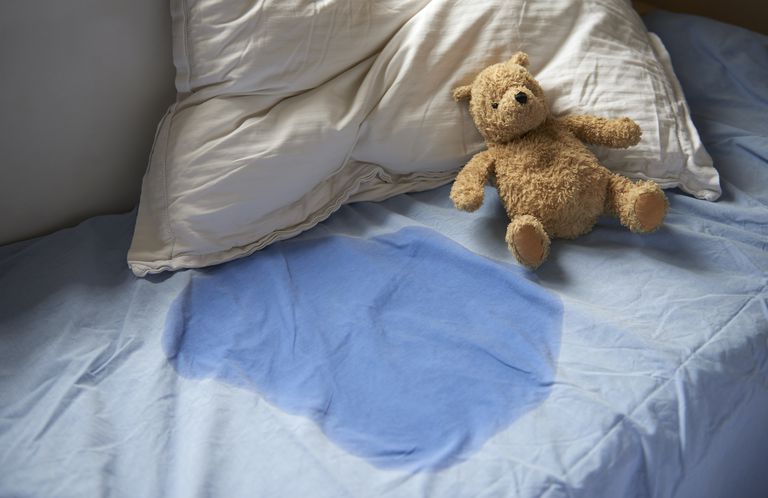Are you struggling with bedtime routines in your house? You are not alone.
From your newborn’s two-hour naps throughout the day and night to your toddler’s reported monster-in-the-closet, you have a way to go before you get that seven-plus hours of recommended sleep you deserve.
But, despite your child’s sleep patterns and nightly concerns there are still ways to help manage and prepare for bedtime that will help you and your child drift off more easily or at least recoup faster.
5 tips to make bedtime less exhausting.

Be prepared
In the first six years of your child’s life it is inevitable that you will have sleep challenges. But challenges don’t need to be difficult to handle and with a little prep you can address issues and be back in bed before you know it. Some challenges you might face are bed wetting, tantrums, and of course nightmares.

Bedwetting
Bedwetting can take time and is more about your child’s body rather than your child not going to the bathroom. Having a supply of nighttime pull-ups, limiting liquids, and going to the bathroom before bed are helpful in controlling bedwetting.
Pro Tip:
- limiting liquids means no water bottle to bed and keeping the last drink 1-2 hrs before bed.
- take the child to the bathroom before bed and when you go to bed. They don’t need to be awake, just put them on the potty to pee.
- do not force this issue and put kids in underware at night before they are ready. You are just setting yourself up for more work.
- make sure that your child has a bowel movement daily. Keeping the bowels regular, decreases night time pee issues.
- if the night time pull ups are not enough, keep the mattress covered in a zip up plastic cover, consider plastic swimmer pants over the diapers, and/or add these inserts to the diaper to decrease leaks.

Tantrums
While tantrums happen, here are some common reasons a child might throw a tantrum. Anticipate and prepare:
- a child’s routine or expectations are not being met resulting in confusion.
- hunger, tiredness, overstimulation can cause a child to become dysregulated.
- more then 1hr of time spent on electronics can cause a lot of neurological irritation
- a diet high in sugar and/or processed foods can cause a child to be irritable.
Pro Tip: the human body can only process 24 grams of added sugar per day.

Nightmares
Having a plan for nightmares is also essential. From creating a happy nighttime routine to being prepared to cuddle and reassure your child that nightmares are not real. It is also helpful to discuss nightmares during the day when your child is awake. Additionally, special toys, stuffed animals or even drawings may be helpful in building confidence that your child is safe.
Pro Tip: Beware! Screen time within 2hrs before bed time is a leading cause of nightmares. Yes, even if its a kid cartoon.

Be consistent
When it comes to children it may not always seem like it, but routine is key. This is especially so for toddlers and preschoolers who need to know what is happening and when. Following the same bedtime routine every night, including weekends, will not only help your child prepare mentally for bedtime, but also limit the number of “I’m thirsty” and “Can you tell me a story” that you will receive just as you are about to fall asleep.
Pro Tip:
- bath time with epsom salts can help relax the little ones
- lavender essential oils can be diffused in a common room during the evening time to calm everyone down
- a back rub with topical magnesium can simmer down the nerves before bed
- electronic devices should be off before dinner time and not on again until the next day

Positive reinforcement
Positive reinforcement is important throughout childhood as your child grows and develops. It not only assures your child that you are proud of them, but also gives your child something to aspire for. So, praising your child in the morning for things like sleeping through the night, keeping a clean pull-up, and sticking to their routine is important and inspirational. Other things such as stickers for achieving goals or an extra five-minute cuddle or story can also be integrated.
Pro Tip: have the child create a treasure box out of an old cardboard box. Have him decorate it with stickers, drawings, and all kinds of silly things. Then go shopping together to the Dollar Store to get some goodies. Place them all in the box. He is only allowed to play with a toy from the box after he has slept in his bed all night, or was dry, or did not wake up super early, etc. Little kids need reinforcement the next day to establish a behavior.

Sometimes there is a monster in the closet
When your child calls you because there is a monster in the closet, that often means they just miss you or are nervous. Taking the time to cuddle and support your child—as well as do a thorough search for monsters—can be turned into a humorous and comfortable way to soothe your child’s nerves.
Pro Tip:
- night lights help if the child can sleep with a light on.
- occasionally the space under the bed can be perceived as really creepy and placing the mattress directly on the floor can make a big difference
- stuffed animals, lovies, or security items help kids be more comfortable in their rooms

Limit Technology
Giving your child a tablet may seem like a good idea so that you have a peaceful night, but it also means your child is likely getting much less sleep than you think. Tablets and phones are a distraction for children, and they will lay in bed for hours watching programs and playing games that might keep them quiet, but also create significant sleep-deprivation. That can grow into their teens where it is reported that 90% of teens sleep with their phones and over 60% use their phones after bedtime.
Pro Tip: electronic devices emit blue light which triggers the body to reduce melatonin production. Melatonin is a hormone we all make. Melatonin levels rise in our body as the sun sets so we can have a restful night. However, with too much blue light exposure in the evening, the melatonin levels stay low preventing us from falling asleep. On average, it takes the body 1-2hrs to raise melatonin to “sleep levels.”




